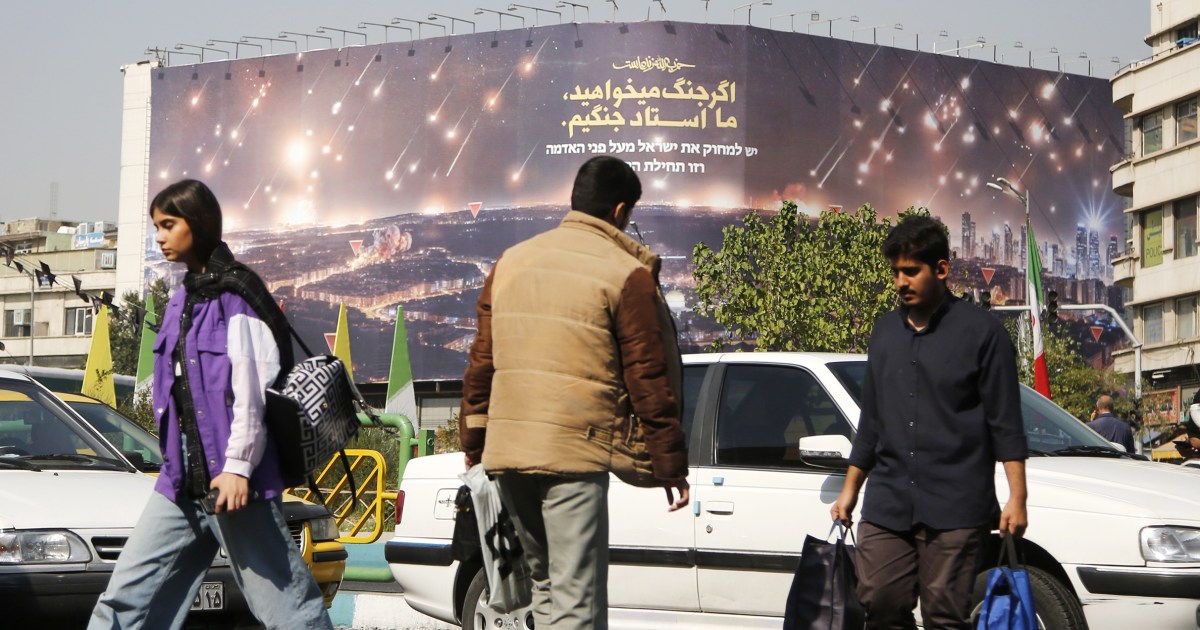DUBAI, United Arab Emirates — Bracing itself for a retaliatory strike from Israel, Iran has been urging its Arab neighbors not to allow Israel to use their airspace, two diplomats from Gulf nations told NBC News on Friday.
Israel has vowed to respond to last week’s ballistic missile attack by Iran, prompting Tehran to warn countries that helping Israel in any way could potentially escalate into war, one of the diplomats said. Both asked not to be named because they were not authorized to speak publicly about the sensitive issue.
“The Gulf Cooperation Council is not interested in being caught in a crossfire,” one diplomat said. “Our focus has been on de-escalation.”
Many Arab nations such as Jordan and the United Arab Emirates host U.S. bases and oil facilities vital to the world economy, and Iran’s warning about helping Israel is raising fears in the region that these sites could become targets.
But the second diplomat added that it was unlikely that any Arab nation would agree to allow its airspace to be used by the Israelis for a strike on Iran.
Both diplomats spoke after an intense diplomatic push by Iranian President Masoud Pezeshkian and Abbas Araghchi, his foreign minister, to shore up support among their Gulf neighbors and persuade them to use their influence in Washington to temper an Israeli attack.
Araghchi traveled to Qatar and his country’s main regional rival, Saudi Arabia, where he held discussions with the kingdom’s leader, Crown Prince Mohammed bin Salman.
Pezeshkian also met with his Russian counterpart, Vladimir Putin, on the sidelines of an international forum in Turkmenistan’s capital, Ashgabat, to discuss the situation in the Middle East, the Kremlin said Friday. It added that he formally accepted Putin’s invitation for a state visit.
Ahead of their meeting, Pezeshkian, widely thought of as relatively moderate, told Russian state TV that Israel should “stop killing innocent people” and that such actions were backed by the United States and the European Union.
Israel has promised that Iran will pay the consequences for launching a barrage of around 200 missiles last week, even though the Israeli military says it shot most of them down and there being only one known fatality — Sameh Khadr Hassan Al-Asali, a 38-year-old Palestinian man who was hit by shrapnel in the occupied West Bank.
Tehran said it had targeted Israel in retaliation for the killings of Hamas leader Ismail Haniyeh and Hezbollah leader Hassan Nasrallah, as well as an April attack on Iran’s consulate in Damascus, the Syrian capital, that killed two of its generals.
Haniyeh was assassinated in Tehran after he attended Pezeshkian’s inauguration ceremony in July, while Nasrallah was killed in an Israeli airstrike. His death came days after several Hezbollah leaders were killed by exploding pagers and walkie-talkies, an attack widely attributed to Israel.
Both Hamas and Hezbollah are backed by Tehran, and Pezeshkian has portrayed Iran as “exercising restraint” because it waited for two months after Haniyeh’s death before attacking Israel.
The timing and nature of Israel’s response remains unclear. On Wednesday, Yoav Gallant, Netanyahu’s defense minister, said Israel’s response would be “deadly, precise and above all surprising.”
President Joe Biden and Israeli Prime Minister Benjamin Netanyahu spoke this week and “agreed to remain in close contact over the coming days,” according to a White House readout of the call.
While some in Israel and beyond are encouraging the country to use this opportunity to launch an ambitious and unprecedented strike against Iran’s nuclear facilities, Biden has said he would not support such an action.
Brig. Gen. Rasoul Sanaei-Rad, a senior adviser to Iran’s Supreme Leader Ayatollah Ali Khamenei, was also quoted by the state-run Fars news agency on Wednesday as saying that striking nuclear sites would “cross regional and global red lines.”
Biden has also cautioned Israel against striking oil facilities in Iran, and Gulf states, worried about their own oil sites coming under attack, have been lobbying Washington to prevent such a move.
Helping to fuel those fears, Abu al-Askari, the military spokesman for Kataib Hezbollah, a powerful Shiite paramilitary group based in Iraq, said in a statement on Telegram that “the world will lose 12 million barrels of oil per day” if Iran is targeted. He also threatened to target “American bases, camps and interests in Iraq and the region” in retaliation.
The Iran-backed militia was suspected of being behind a drone strike on a U.S. base in northeast Jordan, known as Tower 22, in January that killed three U.S. troops and injured more than 30.
However, Matthew Savill, director of military sciences at the Royal United Services Institute, a London-based think tank, said he “wouldn’t be surprised” if Israel “ignored Syrian and Iraqi protestations though, and fly through” their airspace. The alternative would be “a very long route around, down the Red Sea and up,” he added.
“It’s difficult to know how much they are trying to get the Iranians second-guessing themselves and tied-up in counter-intelligence knots,” he said, adding that it was generally assessed that a strike on Iran’s deepest nuclear facilities would “require large weapons that can only be dropped from U.S. bombers.”
In Gaza and Lebanon, people were counting the cost of Israeli strikes. At least 22 people were killed and 117 injured in overnight attacks on Beirut, the Lebanese capital, according to the country’s health ministry. NBC News has reached out to the Israel Defense Forces for comment.
In Gaza, Palestinian authorities said at least 28 people had been killed and dozens more wounded in an airstrike on a school-turned-shelter in the city of Deir el-Balah. The IDF said it was being used as a terrorism command center.

